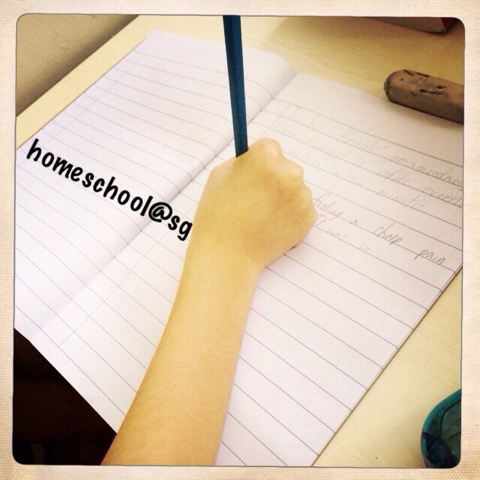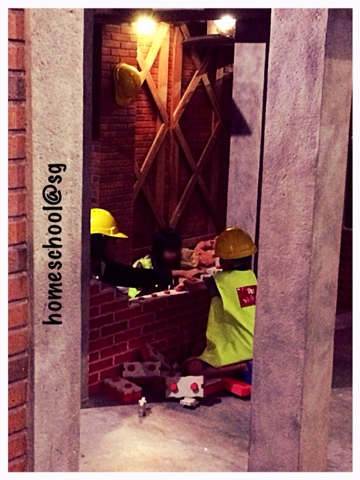I am reproducing the article here, with permission.
+++++++++++++++++++++++++++++
When Sonshine started his primary school journey, I promised myself that I will raise him up to be an independent and self motivated student. I can't say I am there yet. But I have told myself to let go of him a little more with every passing term, semester and year. The first two to three years are the best years to train them as they are considered fairly new to the system. Therefore any mistakes they commit is tolerable and lots of grace is showered upon them. Hence, in my view, there's no better time to instill independence in them than the first two to three years of primary school life.
But how do we train our children to take ownership of their school work? I'm no expert but here are some areas we can work on based on my own experiences.
1. School bag
Teach your child to pack his own bag. This is the basics of basics and the simplest task of them all. Don't do it for your child, teach him how to do it. For the first few times, watch and guide him along. During the first few weeks or term, check to make certain that he packs his bag properly.
Once you are happy with his performance, let him do it himself without any help or checking from you. But what if he forgets to pack an important book that he needs the next day? You can remind him but occasionally let him go to school without that book. Let him learn the consequences. As a principal once said: 'what's the worse that can happen? Get scolding only what!' As I said before, at Primary 1 and 2, the teachers are more forgiving. They understand that these kids still need some guidance. In most circumstances some grace will therefore be extended to them. That's why this is the best time for the child to make mistakes and learn from them.
2. Let your child be your informant
With the emergence of Whatsapp chat groups for parents, it is easy for us to access information about schoolwork even before our children can get to tell us about it. This is helpful especially when our kids are not paying attention in school. While it is okay to seek help from other parents from time to time, I fear that we may become over reliant on each other at the expense of our children cultivating good habits . Overtime, our children may discover that even if they don't pay attention in class, there is always mummy and daddy to help find out what's missing for them. If we constantly swoop in to save our children from punishment, they will never get to learn to rely on themselves. We must teach our children that the onus is on them to listen in class and jot down clearly what he has to do. It is not our responsibility to go round plugging potholes for them.
I took a drastic step and exited from the parents chat group at the beginning of this year. I knew if I hung in there, I would lose sight of my objective. To give an example, there were a few occasions I found out Sonshine's class was suppose to complete a task from the parents in the chat group yet he had cleanly forgotten about it. Many a time, I caved in and quickly reminded him for fear of him getting punished by the teacher. But looking back, those were perfect opportunities for him to learn about responsibility. With my exit from the chat group, I am less aware of classroom happenings, and as a result he has to become more alert and be on his toes. I also made it a habit not to ask other mothers (whom I am close to) when Sonshine seems unsure what he is suppose to do for any assignment. Often, I would ask him to think harder. If he forgets, too bad. Ultimately he has to discover that this is his school life, not mummy's, not daddy's; ultimately he is the one who receives punishments for the things done incorrectly, not us. He has to step up and take care of himself.
I am not encouraging parents to leave the chat groups. I do see the advantage of being in them. Stay connected by all means but my point is, don't always fall back on others for help, rely more on your child than the other folks. After all, in our parents' time, there was no such thing as mobile messaging! Families didn't exchange phone numbers (well at least not with my folks)! If I recall correctly, my mother had to rely entirely on what I told her about what went on in school; there was no way she could find out if I was being truthful or not. I was completely on my own. If our parents could do it, I don't see why can't we. Use what you have read in the chat group wisely and strategically. Don't always be too quick to to step in to 'save' the child based on the 'extra' information offered in chat groups.
3. Homework
Most schools issue handbooks to the students and they are expected to write down the homework for the day. Instead of rummaging through your child's bag everyday to track of his assigned homework , have your child do it. Teach him to look up his own handbook and how to create a homework check list. Train him to take out his handbook everyday and check what he has to complete for that day. Again, what if he missed out a homework or two? I stand by my usual mantra, occasionally let him go to school with the undone homework and face the music.
If possible, try not to help them with their homework. Allow them to make and submit mistakes. Let them learn. I never believe in handing in perfectly completed homework. I would rather the teacher have a true perception of my child's ability. Sometimes Sonshine would ask me for help. As cruel as it sounds, I always ask him to think harder instead of explaining or giving the answers to him. I rarely help him all the way; at most I'll hand him a dictionary or google some guidelines to help him. I always tell him that I will not be sitting next to him in school during his tests and exams. He has to first try figuring it out on his own. If he gets it wrong, then he has to learn from it and not repeat the same mistake again.
4. Self study
In Primary 1 and 2, it is pretty much a honeymoon period as most would say. School life is pretty easy peasy. Hence, what better time to instill habits like self studying than now? There aren't any major examinations being held. BUT, there are spelling tests every week. Instead of sitting down with your child and going through every letter of every word on the list, why not teach him how to study on his own? Make this a habit so that hopefully by the time he gets to the upper primary level, he would not be adverse to self studying and be equipped with the know how.
5. Let them fail
A friend shared that during the first year of her daughter's schooling, she had a hard time with her daughter when it came to helping her study for her tests and what nots. To the point where both parties got very frustrated. In the end, my friend decided not to help her daughter with her studies any longer. Her child didn't do very well for her tests and felt ashamed of her marks as compared to her friends. Because of that her daughter eventually pulled up her socks, took ownership of her own work and aced the rest of her tests with no help whatsoever from her. To be honest, this is something I simply dare not try. But I do think this is the fastest and easiest way for the child to learn to take responsibility in their work. Of course, it may not work for every child. I know it would have no effect on some students. LOL! Please exercise discretion!
I understand every child is different. Some children need more guidance while there are some who are fiercely independent. I think it is okay and certainly a must to step in if the child cannot seem to cope in class. These suggestions are not hard and fast rules. Only you know your child best, when he really needs your help, when he does not and which areas you can let go of and which not to. There are many other ways and areas we can train them to become truly independent in their school life. Whatever it is, we must be wise in choosing the appropriate timing to render help or simply step aside and watch them falter and learn. My rule of thumb is, if they are capable enough to do it themselves then have them do it without your help.
I cannot say I am there yet. There are many areas where I am still a helicopter parent. I wish I am not. I still cannot but want to micro manage many aspects of his school life. I am still learning to let go and hopefully my above suggestions will help others who are learning too.






